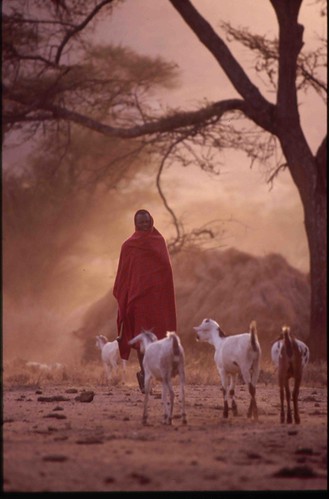A Maasai man takes his goats out in the early morning for a day’s grazing in northern Tanzania (photo credit: ILRI/Mann).
An international conference deliberating the future of pastoralists in Africa is taking place this week (21–23 March 2011) at the Addis Ababa, Ethiopia, campus of the International Livestock Research Institute (ILRI).
Big changes are occurring in, and to, Africa’s vast pastoral regions. Livestock herders’ access to resources, options for mobility and opportunities for marketing are all evolving fast. Is there, the organizers of this conference ask, opportunity for a productive, vibrant, market-oriented livelihood system or will pastoralist areas remain a backwater of underdevelopment, marginalization and severe poverty?
The Future Agricultures Consortium, an alliance of agricultural development researchers and practitioners that facilitates policy dialogues and debates on the role of agriculture in broad-based African growth, and the Feinstein International Center at Tufts University, which also has a mixed staff of development researchers and practitioners, have jointly organized this conference to share new learning about ongoing change and innovation in Africa’s pastoral areas.
One of the aims of the conference organizers is to shift the crisis narrative that so often dominates news and discussions of pastoralists in Africa. As noted on the Future Agricultures Consortium website: ‘Frequently depicted as in crisis, pastoralists are changing the way they live and work in response to new opportunities and threats revealing the resilience that pastoralists have demonstrated for millennia. Accessing new markets and innovating solutions to safeguard incomes, this often misunderstood and marginalised community is re-positioning itself to make the most of the East African economy. . . .
‘The pastoralist way of life—synonymous with irreversible decline, ‘crises’ and aid rescues—is poorly understood. And whilst the words ‘pastoralism’ and ‘crisis’ have become fused in the minds of many, there are positive signs of vibrant pastoralist livelihoods that debunk the usual reportage of pastoralists depicted as insecure, vulnerable and destitute. . . .
‘Failed by generations of unsuccessful state development plans and aid strategies, pastoralists have been let down because the real problems and issues they face have not been taken into account. A more accurate understanding of the processes of change happening within pastoralist areas, which are significant and complex, has been obscured by the perpetuated myths of pastoralism in crisis.
‘Understanding the complexity and potential for pastoralism is crucial to informing policies for securing the future of this age-old and resilient sector in sub-Saharan Africa.’
Hot topics
The new research and practical experiences being shared at this conference are on the following hot topics in academic and development research.
• Regional pastoralist policies (and the politics of pastoralist policy)
• Mobility and the sustainability of pastoralist production systems
• Impacts of climate change on pastoralism
• Commercializing pastoralism through better markets and trade
• Delivering basic health, education and veterinary services to pastoralists
• New approaches for strengthening pastoralist livelihoods and social protection systems
• Alternative livelihoods and exit strategies for pastoralists
• Pastoralist views of land grabbing and land tenure
• Pastoralist innovations
• How conflicts are affecting pastoralist development in the Horn of Africa
• The place, and potential, of youth and women in pastoralist societies
Researchers, policymakers, field practitioners and donor representatives at this conference are assessing the present and future challenges to African pastoralism so as to begin to define new research and policy agendas.
For more information, visit the Future Agricultures Consortium website conference page or blog and revisit this ILRI News blog.


Pingback: The case for index-based livestock insurance and cash payments for northern Kenya’s pastoralists « ILRI news